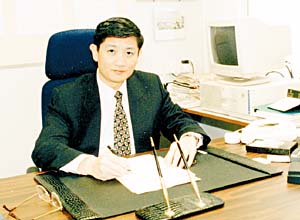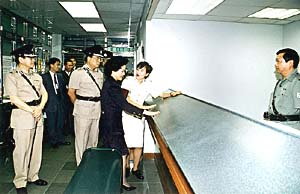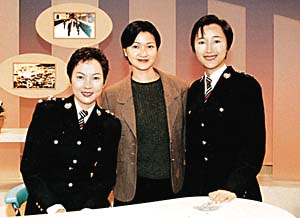



















aims high - and into the 21st Century | ||

CSP Mak: "We do not want to wait for things to go wrong. Rather we want to adopt a best practice approach - to look around and determine what are the best practices used by other police forces, private and public corporations, etc. In this way we can improve our services to both the public and our Force members" |
| |
|
So when Chief Secretary Anson Chan toured North Point Division police station last month she had in effect stepped into a laboratory of sorts - a crucible in which new ideas and procedures that are at the heart of frontline police work will be reviewed, tested and, once implemented, will render optimum service to the people of Hong Kong. "The Force has been considering the best way to further advance service quality initiatives to provide the public with a customer focused service which is linked to our Vision and Statement of Common Purpose and Values," explained project manager Eddie Mak Man-poon, CSP Service Quality Wing, Performance Review Branch. "The Consultancy Support Project fits into our overall strategy on service quality." Earlier initiatives on a Force-wide level began with the Force Strategy on Quality of Service in 1995 and have included the formulation of a Force efficiency statement, a Living the Values campaign, staff and public opinion surveys, customer satisfaction surveys, development of Work Improvement Teams, Staff Suggestion and Staff Motivation Schemes, and a Support Network which provides a forum for discussion within the police formations. At the same time, Hong Kong Island personnel conducted their own independent study in the area of report room services and came up with 24 recommendations for improvement. But the Police Force's quest for continuous improvement in its services to the public will not end there. In fact, the ongoing initiatives have laid the groundwork for the next stage of development. "As you can see, a number of good ideas have been floating around and there are certain areas which we can improve on," said CSP Mak. "So, we've picked a pilot police station and it's now time for us to roll up our sleeves, get our hands dirty - and really get something done based on what has been suggested and accomplished so far." | ||
|
North Point police station was chosen by DCP MAN (head of the steering committee responsible for the overall direction of the consultancy project), as a "pilot" station because it is characteristic of a typical police station in Hong Kong. Its district management is also very supportive and keen to get involved. The starting point of this Customer Service Project will be a review of the delivery of North Point's report room services to the public. After that, the customer improvement process will be extended to other areas of police/public contact including the crime office and the property office. |
 Chief Secretary Anson Chan tours the report room of the North Point "pilot" police station, where the Force Consultancy Support Project is in the process of beginning. The aim is to improve customer service | |
|
Said CSP Mak: "When we conducted the customer satisfaction survey, although the satisfaction rate was quite high, it also reflected a number of deficiencies in our services. So we will start by concentrating on where we can improve, such as in the areas of follow-up action and closing interviews with members of the public who use the report rooms. There is also room for improvement in report room personnel's telephone answering techniques. "In North Point there are two streams: early windows of opportunity - things we can identify and improve quickly like: signage that indicates to members of the public what they can expect when making a report; or a well organised reception procedure that prioritises reports by their significance; and a proper queuing system. Communication with the public is a key factor. If you tell people what to expect it will reduce misunderstanding and make sure when they leave a police station - they do so as happy customers. "The second stream involves taking a hard look at the culture change aspect and wider, longer-term reforms for the future," Mr Mak added. "We expect Work Improvement Team to be set up within each station who will meet regularly to discuss what's been going on, what resources they require and ways they can improve customer services and initiate best practices." CSP Mak is quick to point out the prime importance of soliciting ideas from frontline officers themselves, emphasising the "consultancy" aspect of the project. This entails making optimum use of the Staff Suggestion Scheme and Staff Motivation Scheme, as well as the Support Network system. At the moment each of the 15 major formations regularly sends two representatives to the Support Network forums to discuss what's been going on in their respective formations. "We set up this informal channel because people are more likely to talk not only about their successes but also their failures when not confronted with the pressure of having to make a formal report," explained Mr Mak. "We just sit down and talk, reducing the amount of paperwork to a minimum, while at the same time creating a database so officers can examine some of the initiatives that have been taken up - and then they can take from there. The major formation reps also share their ideas with their liaison officers in the districts and divisions, who are fully encouraged to initiate their own surveys to determine the needs of their local customers." CSP Mak emphasises the equal importance and continuous seeking of input from local people - community leaders, Fight Crime Committee members, residents, schools teachers, etc - thereby identifying customer segmentation and the type of core competencies and job descriptions required from those officers who staff the report rooms so that they can be given proper training. "After North Point, hopefully important lessons will be learned," said Mr Mak. "We will then design and implement these strategies to other sub-units within the division, then to the district, the region and on to a Force-wide level. That's basically the roll out plan." Price Waterhouse management consultants have been awarded a one-year contract to aid the Force in this Consultancy Support Project. Leading experts in aspects of large, complex organisational change in both private and public corporations (including other police forces), Price Waterhouse consultants began on 6 October 1997 and will work closely with the Performance Review Branch of the Service Quality Wing. Right now their consultants are meeting as many North Point officers as possible explaining the project and soliciting ideas. Their action plan will be tabled for discussion at the steering committee meeting next Tuesday (9 December). What will be endorsed there will allow the pilot project to start in February 1998. Upcoming issues of OFFBEAT will continue to monitor the progress of the Force Consultancy Support Project and feature commentary from the project consultants, as well as feedback from officers and members of the public affected by this project, and North Point District management. | ||
|
for Police Magazine and Police Report | |
 On air presenters of Police Report and Police Magazine toast the police broadcasts' new season | AFTER a short two-month hiatus, the Force television shows Police Magazine and its English-language counterpart, Police Report, have resumed their broadcasts with exciting and fresh programmes and a new face - WIP Maxim Kwok Mei-sum whose previous posting was with the Miscellaneous Enquiries Sub-unit in Aberdeen Division. She replaces WSIP Elaine Cheung Yee-ling (who's gone to the Child Protection Policy Unit), and joins WSIP Connie Chung in front of the camera. |
|
"Television is a very effective communication tool," said WCIP Betty Lam Cheung Suk-chi of PPRB's TV and Films Liaison. "Twenty-four years ago, the Force began to broadcast anti-crime messages on television. Back then, the Hong Kong Police jointly produced with RTHK two 15-minute programmes called Junior Police Call, and Police Call on the Chinese and English channels respectively. These were the forerunners of Police Magazine and Police Report. "Eventually police inspectors replaced media people as the shows' presenters and the scope of the programmes was expanded to include case appeals, features, personality profiles, glimpses on police activities and seasonal advice." In fact, the programmes' useful advice has prevented many viewers from becoming victim's of crime, while others have in turn helped police with their cases by responding to on air appeals for information and crime witnesses. Continues Mrs Lam: "To keep pace with an ever-changing Hong Kong community and to meet the demand on our quality of service, we continuously review, update and challenge ourselves to present the best programmes as possible in terms of content and relevancy. In 1994 the Chinese-language Police Magazine was increased to 30 minutes, while the English-language Police Report broadcast was condensed to five minutes." WCIP Lam points to the creative and professional input of her colleagues whose dedication to the shows' success provided a very well-received season opener which included an exciting police case re-enactment, useful tips on preventing credit card fraud via the internet, and the danger of speeding on the roads and highways of Hong Kong. "We are constantly striving to improve our programmes and attract more viewers," she added. "We see our audience as both members of the general public as well as the Force. So new ideas, comments and suggestions are always welcomed - especially from police colleagues. Their support will definitely contribute to the success and impact of the episodes - and help us to meet the high objective of police television programming." | |
|
Viewers can catch Police Magazine Saturdays from 7 to 7:30pm on TVB Jade, which is repeated the following Sunday on ATV's Home Channel between 8:30 and 9am. Transmission time for the English-language "Police Report" is Saturdays on ATV World Channel between 6:25 and 6:30pm - then later repeated on TVB Pearl from 7:20 to 7:25pm. WCIP Lam can be reached at: 2866-6185. |
 Programme presenters WSIP Connie Chung and outgoing WSIP Elaine Cheung Yee-ling flank new arrival Wip Maxim Kwok Mei-sum |

